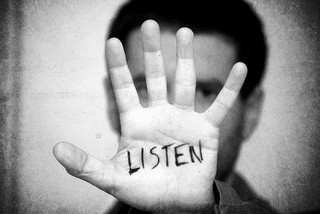 Not long ago we shared five obstacles to becoming an effective listener because good listening is an essential skill for a happy and long-lasting marriage. Authors Paul Donaghue and Mary Siegel give us ten rules of thumb for becoming a good listener in their book, Are You Really Listening?: Keys to Successful Communication.
Not long ago we shared five obstacles to becoming an effective listener because good listening is an essential skill for a happy and long-lasting marriage. Authors Paul Donaghue and Mary Siegel give us ten rules of thumb for becoming a good listener in their book, Are You Really Listening?: Keys to Successful Communication.
Read through the following ten tips for effective listening and choose just one to implement today and develop as a good communication habit.
10 Tips for Effective Listening
- Make a commitment to listen to this person at this moment.
- Do not act as though you are listening if your heart is not in it or if the time is not right for you to listen.
- If you want to listen but are not free to pay attention at the moment, say so, but add that you would like to listen later. For example: “I can’t give you my attention now, but how about we talk after I finish this report, say at 3:00?”
- Focus on the speaker with your eyes and your body position.
- Focus on the speaker’s feelings, needs, and perceptions or on the information that is being communicated.
- Register your own feelings, needs, and perceptions.
- Be aware of your typical non-listening behaviors and try to control them.
- Offer back what you are hearing in your own words with your voice rising in a questioning tone.
- Don’t presume that what you are hearing is exactly what the speaker is trying to say.
- Don’t stop listening after your first effort to express understanding. Keep listening until the speaker confirms that you have really understood.
Once you master one of these tips, move on to another tip. So, this evening you might decided to focus on tip #4 “focus on the speaker with your eyes and your body position.” Doing this just once is probably just the tip of the iceberg. Focus your attention on your eyes and body position, then evaluate how well you did.
Try it again in the morning, then again the following night. Do this for a few days and you’ll be able to make good eye contact and body position a habit that pays off in the way you communicate with your spouse.
Once you’ve mastered one of the tips above, move on to another. Only focus on one at a time. The more focus you can place on these listening and communications skills, the more you will be able to develop a level of mastery that is going to pay dividends in your marriage.
Don’t hide the fact that you are working on your listening skills. Be up front about it with your spouse. Ask for feedback after a serious conversation. Apologize for making mistakes or falling short of being a good listener. The more humble you can be about how well you listen, the better spouse you may become.
Did you try to implement one of these ten tips for effective listening? How did it go? Share your stories in the comments below.
(photo credit: B Rosen)







